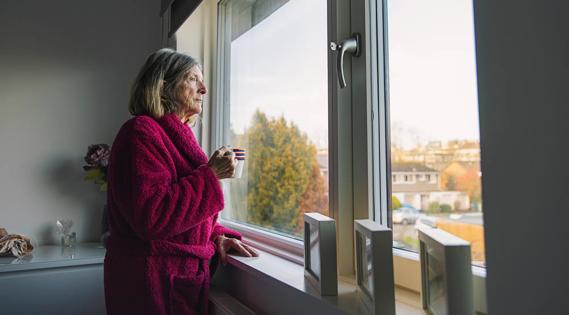Advertisement
Solutions for when the days all blur together

Time flies when you’re having fun. It slows to a crawl when you’re waiting for a mind-numbing meeting to end. And when you’re social distancing at home during a global pandemic, time becomes meaningless.
Advertisement
Cleveland Clinic is a non-profit academic medical center. Advertising on our site helps support our mission. We do not endorse non-Cleveland Clinic products or services. Policy
At least, that’s how a lot of people are feeling these days. One day oozes into the next. (Wait, is it Wednesday or Saturday? 2020 or 2025?) Some days drag on endlessly; others seem to be over in the blink of an eye.
If you’ve lost the ability to track how many days have passed since you’ve changed your yoga pants, you’re not alone.
“Your brain is used to operating one way. Now everything is flipped, and the whole world is disrupted,” says social worker and holistic therapist Maura Lipinski, LISW-S. But you can restore your internal clock. “It doesn’t have to be ‘Groundhog Day’ every day,” she says.
Our internal sense of time is more complicated than you might think. Emotions, memories, events, even whether you’re hungry or tired can affect how you perceive the passage of minutes, hours and days. So it’s no surprise that an event like a global health crisis might mess with your brain’s sense of time.
In fact, so many people have reported an altered sense of time that researchers have begun studying it. A team of scientists from around the world is leading a project to examine how physical distancing is affecting our relationship with time. Though the findings aren’t out yet, it helps to know that the phenomenon isn’t all in your head.
Advertisement
Losing track of time can be disconcerting, and it contributes to feelings of restlessness and irritation. These suggestions can bring some structure back to your days:
“There’s something beneficial about deciding that Tuesday doesn’t have to look like Thursday,” Lipinski says. You don’t have to create an elaborate agenda. But scheduling regularly occurring events — Tuesday laundry day, Friday movie night, Sunday morning waffles — can help anchor your days.
If you had a doctor’s appointment, you’d do your best to show up on time. Try to treat your life like a series of can’t-miss appointments. Besides the must-do stuff like work deadlines and reminders to order groceries, schedule fun things, too.
Write down appointments for important self-care activities like exercise, checking in with friends and going to bed at a reasonable hour. “Set your schedule and hold to it,” Lipinski says.
If you’re losing track of your aimless days, try setting concrete goals for the day (go for a walk, call your mom) or the week (clean your closet, schedule a telehealth appointment).
It also helps to think about long-term goals. Where do you want to be in one year or five? “It’s hard because we don’t know what to expect, but it can help to have a direction for the future,” notes Lipinski.
The sun is setting, and you’re still in your pajamas? That’s okay. We’re all struggling to adapt to circumstances that are anything but normal, and beating yourself up won’t do you any good.
“We’re overwhelmed right now, and it’s easy to get caught up in negative ideas like ‘What have I accomplished?’” says Lipinski. “If you notice a negative thought come up, try to change your perspective. We need some of that hopefulness during this time.”
Having a routine gives us a sense of control over our lives. That’s especially important when so much feels beyond our control.
To fight back against the emptiness of endless days at home, try to focus on the things you can control, even if it’s just cooking a healthy meal and going to bed at a reasonable hour. “Take control over what you can, and honor the fact that you accomplished those things,” Lipinski suggests.
Eventually, this crisis will end, and time will continue on its steady march. Who knows? You might even look back fondly at the memory of all that free time (or at least all the time you got to spend in yoga pants).
Advertisement
Learn more about our editorial process.
Advertisement

Studies have shown promising results, but additional research is needed

Infection and inflammation can cause you to lose your voice and have other voice changes until you’re fully healed

A COVID-19 infection can bring on depression or anxiety months after physical symptoms go away

Just like the flu, COVID-19 continues to evolve every year with new and smarter variants

The latest omicron subvariants carry specific mutations that may allow the SARS-CoV-2 virus to be better at evading immune protection

You can work out with mild COVID-19, but not in a gym, and listen to your body and don’t overdo it

Most people can return to work and regular life when they’re symptom-free for 24 hours

Lysol Disinfecting Wipes are just one of more than 500 products approved by the EPA for protection against the SARS-CoV-2 virus that causes COVID-19

If you’re feeling short of breath, sleep can be tough — propping yourself up or sleeping on your side may help

If you fear the unknown or find yourself needing reassurance often, you may identify with this attachment style

If you’re looking to boost your gut health, it’s better to get fiber from whole foods